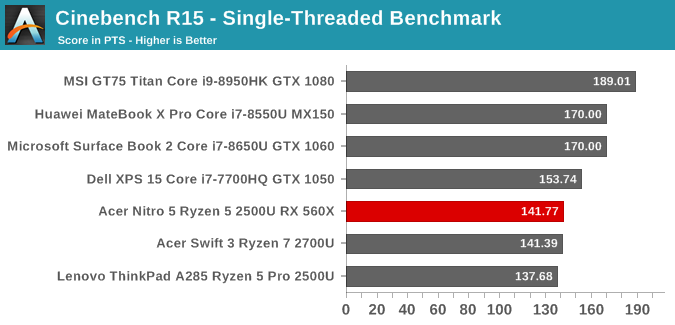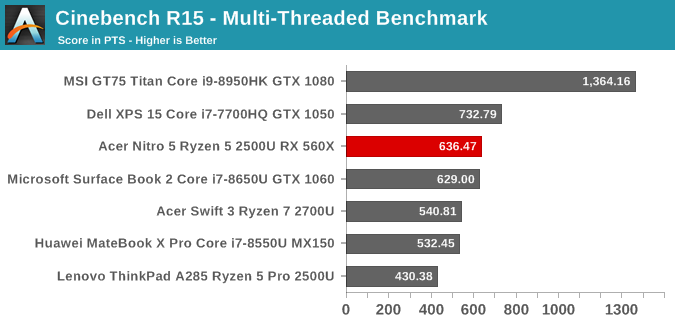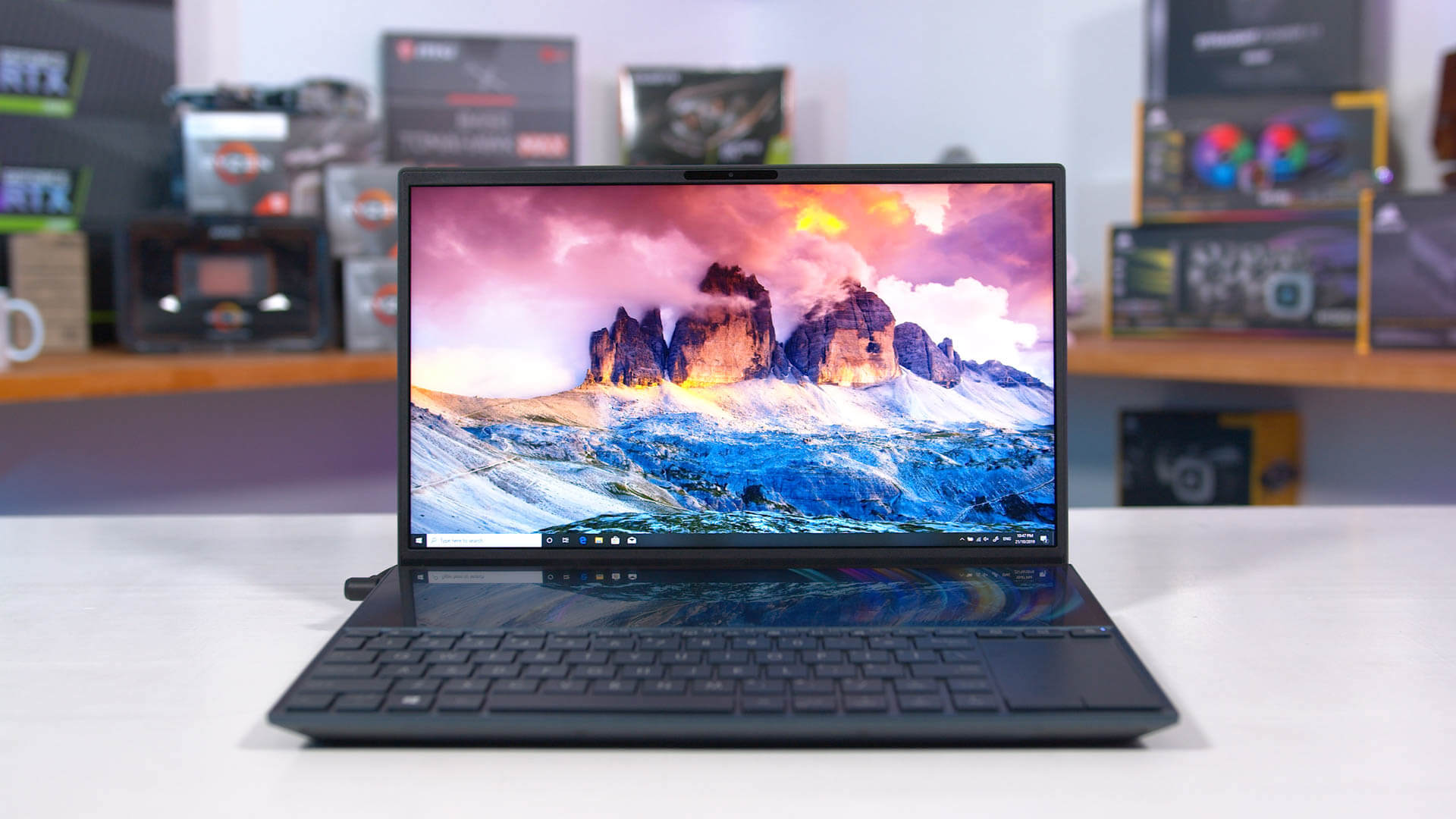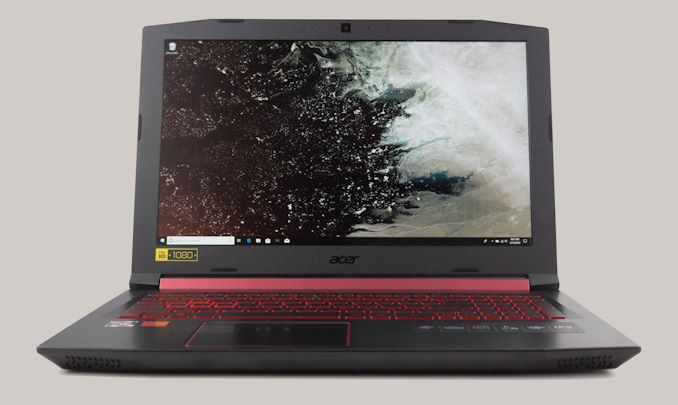Today we're reviewing another 10th-generation Intel CPU, and like the last one we tested, the 4-core/8-thread Core i5-10210U is much more interesting than it appears at face value. You'd think that with these 14nm+++ CPUs Intel has basically nothing left in the tank, but even with the quad-core we're reviewing today, that's surprisingly far from the truth.
You are using an out of date browser. It may not display this or other websites correctly.
You should upgrade or use an alternative browser.
You should upgrade or use an alternative browser.
Testing the Intel Core i5-10210U: 10th-Gen Laptop CPU with Adaptix Technology
- Thread starter Scorpus
- Start date
So, basically you need a processor with 6 cores, higher Whatt consumption and higher speced gpu to beat an old Ryzen 2500u?
Core i5 is 4C
LOL, that's your analysis? Try again, here's a starting point: this 4-core Intel chip was >25% faster than the Ryzen 2500U in more than half of the tests and it did that using 15W vs the Ryzen using 25W.So, basically you need a processor with 6 cores, higher Whatt consumption and higher speced gpu to beat an old Ryzen 2500u?
The Ryzen chips have a single advantage over Comet Lake Intel chips, which you can see in the graphs: they have a much better iGPU, which is faint praise as laptop iGPUs are scraping the bottom of the GPU performance barrel.
You can see the 3750H which is a 35W part, 4 core 8 thread. The 10210U gets awfully close to it with Adaptix so AMD needs Zen 2 to compete.What Ryzen2500u doing in this tests ???? Where 3XXX series ??? Shame guys..
Shadowboxer
Posts: 2,074 +1,655
The 3500u is a 12nm part. But they have been out for a little while at least. I previously briefly owned a 2500u laptop and now I have a 3500u device, tbh the only difference I can make out is significantly better battery life on the 3500u. But the 3500u laptop is definitely a little bit slower slower at general computing than my i5 8250 work laptop however probably runs rings around it when gaming (I wouldn’t know I don’t game on my work laptop).You can see the 3750H which is a 35W part, 4 core 8 thread. The 10210U gets awfully close to it with Adaptix so AMD needs Zen 2 to compete.
I rarely comment to post, but I was waiting for someone to compare the 10gen 14mn i5 vs the 8th gen. Thanks Tim, this was exactly what I needed since I was looking at some of those 10gen laptops... And I was never confused by this whole new gen but still 14nm thing. Very very nice thanks again!
Jimster480
Posts: 160 +142
The performance numbers you list for the Ryzen 5 2500U are incorrect. Which laptops did you test to get these scores? Because they are much lower than the scores I have on my Nitro 5, which runs at 15w TDP.
My CB15 Score is 650 Multi, 143 Single.
My R20 Score is currently 1391 Multi and 309 Single (although it may be possible to retest and get this number a bit higher).
For 7-Zip I got 16.1 / 15.6 Compression and 322MB Decompression... Basically in my testing with my Nitro 5 (2018 edition) the 2500U absolutely romps on these new CPU's as it did last year as well.
I don't have blender or handbrake on the laptop but I could download them to test... Either way these graphs make little sense (and the Ryzen CPU's looked like their performance was too low, which is why I had to go look at my own scores and test Cinebench R20) because Ryzen is a lot closer to the top in those charts.
My CB15 Score is 650 Multi, 143 Single.
My R20 Score is currently 1391 Multi and 309 Single (although it may be possible to retest and get this number a bit higher).
For 7-Zip I got 16.1 / 15.6 Compression and 322MB Decompression... Basically in my testing with my Nitro 5 (2018 edition) the 2500U absolutely romps on these new CPU's as it did last year as well.
I don't have blender or handbrake on the laptop but I could download them to test... Either way these graphs make little sense (and the Ryzen CPU's looked like their performance was too low, which is why I had to go look at my own scores and test Cinebench R20) because Ryzen is a lot closer to the top in those charts.
Jimster480
Posts: 160 +142
Except that they are not, check out the post that I just made. I tested my own personal 2500U laptop and the scores are much higher than reported here.LOL, that's your analysis? Try again, here's a starting point: this 4-core Intel chip was >25% faster than the Ryzen 2500U in more than half of the tests and it did that using 15W vs the Ryzen using 25W.
The Ryzen chips have a single advantage over Comet Lake Intel chips, which you can see in the graphs: they have a much better iGPU, which is faint praise as laptop iGPUs are scraping the bottom of the GPU performance barrel.
Also I have purchased 5 different 2500U laptops over the last year for family members and I have run Cinebench, Passmark, Heaven, PC Mark on all of them and they all performed quite similarly with my Nitro 5 being the fastest by a few % due to better cooling.
The 622 Multicore R15 score is actually closer to the slower 2500U scores as most laptops I tested scored from 625-640. There is only one budget HP and one Budget Lenovo which scored 599 after thermal throttle.
Jimster480
Posts: 160 +142
The funny thing is that they are using 45W on PL2 boost and 18W on PL1... I can tell you from the chip reported power figures that the most power my Nitro 5 will draw is 23W across the whole package + Cores (Package ~13.48W, Cores 9.91W) for the initial boost phase.So, basically you need a processor with 6 cores, higher Whatt consumption and higher speced gpu to beat an old Ryzen 2500u?
Jimster480
Posts: 160 +142
Last but not least... the unit tested here by Tim is not the Zenbook Pro Duo as he mentioned in the article. Its the Zenbook Duo. The Pro Duo uses a 6c or 8c chip and is 15.6" with dual 4K screens. Its a totally different laptop.
Based on your numbers, I expect Blender to score higher than what HUB shows here but I don't expect a big improvement in Handbrake h.265. Maybe an improvement in h.264 though.The performance numbers you list for the Ryzen 5 2500U are incorrect. Which laptops did you test to get these scores? Because they are much lower than the scores I have on my Nitro 5, which runs at 15w TDP.
My CB15 Score is 650 Multi, 143 Single.
My R20 Score is currently 1391 Multi and 309 Single (although it may be possible to retest and get this number a bit higher).
For 7-Zip I got 16.1 / 15.6 Compression and 322MB Decompression... Basically in my testing with my Nitro 5 (2018 edition) the 2500U absolutely romps on these new CPU's as it did last year as well.
I don't have blender or handbrake on the laptop but I could download them to test... Either way these graphs make little sense (and the Ryzen CPU's looked like their performance was too low, which is why I had to go look at my own scores and test Cinebench R20) because Ryzen is a lot closer to the top in those charts.
When I was considering what to buy for Blu-ray conversions to h.265, I waited until Coffee Lake came out after Ryzen 1 because in the reviews, Ryzen 1's only performance drawbacks vs. Kaby Lake were h.265 and gaming FPS (if you have an overkill Gfx card). Since the only things I did on my PC which challenged the CPU were h.265 and gaming, I got a Core i5-8400. 2 yrs later maybe the 1600X would have been better as I'd have the 3900x as a reasonable upgrade option, but since then I have built 2 Ryzen PCs (R3 1200 and R5 2600) for other people and uses, for exactly those upgrade reasons.
Pics or GTFO. Anyone can claim "oh well I've bought 5!! AMD laptops and they ALL performed better then this, the reviewer is WRONG".The performance numbers you list for the Ryzen 5 2500U are incorrect. Which laptops did you test to get these scores? Because they are much lower than the scores I have on my Nitro 5, which runs at 15w TDP.
My CB15 Score is 650 Multi, 143 Single.
My R20 Score is currently 1391 Multi and 309 Single (although it may be possible to retest and get this number a bit higher).
For 7-Zip I got 16.1 / 15.6 Compression and 322MB Decompression... Basically in my testing with my Nitro 5 (2018 edition) the 2500U absolutely romps on these new CPU's as it did last year as well.
I don't have blender or handbrake on the laptop but I could download them to test... Either way these graphs make little sense (and the Ryzen CPU's looked like their performance was too low, which is why I had to go look at my own scores and test Cinebench R20) because Ryzen is a lot closer to the top in those charts.
Show us active screenshots of your machine doing these benchmarks.
Pics or GTFO. Anyone can claim "oh well I've bought 5!! AMD laptops and they ALL performed better then this, the reviewer is WRONG".
Show us active screenshots of your machine doing these benchmarks.
Ok, here is my
R15 screen shot
R15 (2).png
 drive.google.com
drive.google.com
R20 screen shot https://drive.google.com/file/d/1GtuRWTQQ06PelpqYt0UWDZjvPzlALEZX/view?usp=drivesdk
Picture of my 15w 3500u HP Envy x360 after running R20. https://drive.google.com/file/d/1BFouZYqyjYzlpgguiFF9lMqQvzIyp_qR/view?usp=drivesdk
Mind you this is a 2.8lb 13.3 laptop measuring 12x8x.6 roughly with about the worst cooling solution you can probably have to save weight..
So now what?
Those are all 3500U laptops, this article only had numbers for a 2500U laptop. Zen+ vs Zen. There were similar differences between the 2600 vs the 1600 for example (1291 vs. 1150 in CB15)
Anandtech reviewed the 2500U version of the Nitro 5 and got very similar Cinebench results to ourselves:


Note that Cinebench scores can vary a lot from system to system anyway:

 www.notebookcheck.net
www.notebookcheck.net
In the above link, one can see 2500U systems performing similarly to 3700U systems.


Note that Cinebench scores can vary a lot from system to system anyway:

The Ultimate Ryzen 5 3580U vs. Ryzen 3500U and 3700U CineBench Comparison: Almost All Alike
Microsoft's semi-custom approach to Ryzen isn't really any better than the best Ryzen 5 3500U or Ryzen 7 3700U laptop you can buy in terms of performance. It's certainly good and comparable to the Core i7-1065G7 in some respects, but benchmarks for the Ryzen 5 3580U show it to be nothing special.
 www.notebookcheck.net
www.notebookcheck.net
In the above link, one can see 2500U systems performing similarly to 3700U systems.
Those are all 3500U laptops, this article only had numbers for a 2500U laptop. Zen+ vs Zen. There were similar differences between the 2600 vs the 1600 for example (1291 vs. 1150 in CB15)
Correct, and that isn't even addressed here. Even though they don't have any 3000 series Ryzen chips tested (no idea how that's possible but ok) they don't even mention the existence of the 3000 series and that's it's comparable to the 10210u in CPU performance. iGPU performance is a freaking joke for Intel.
Similar threads
- Replies
- 29
- Views
- 801
- Replies
- 30
- Views
- 1K
Latest posts
-
US tech czar warns China is only two years behind in semiconductor and chip design
- BuckarooBonzaii replied
-
Cloudflare CEO warns AI crawlers and summaries are eroding the internet's business model
- Squid Surprise replied
-
TechSpot is dedicated to computer enthusiasts and power users.
Ask a question and give support.
Join the community here, it only takes a minute.

